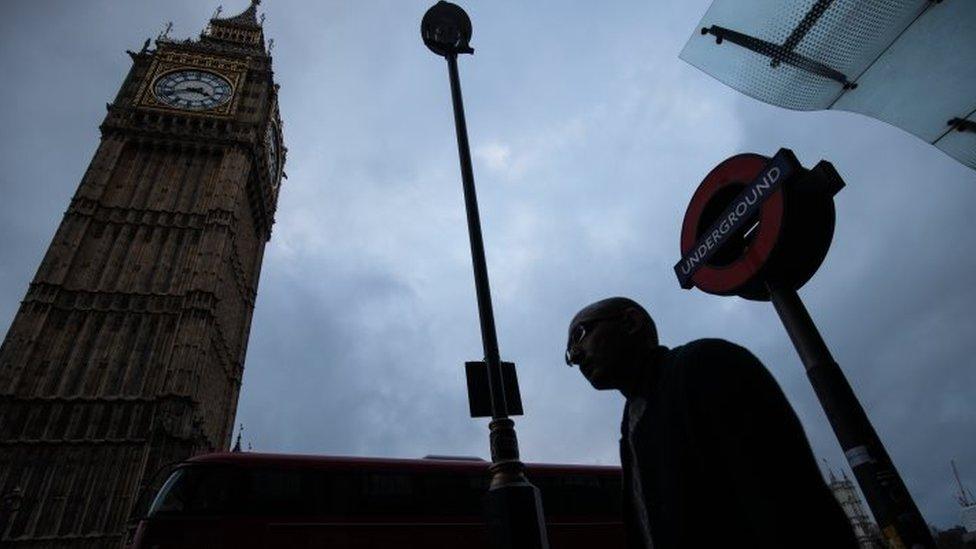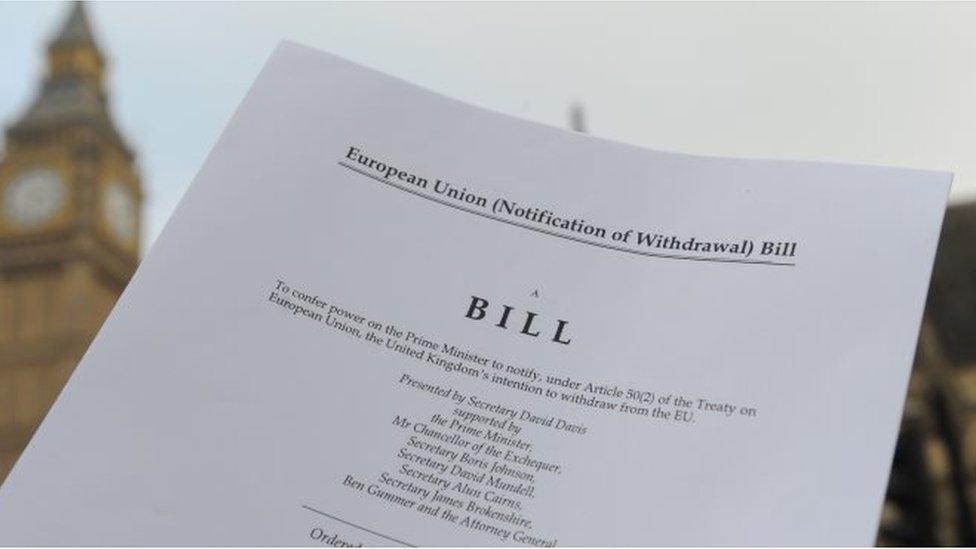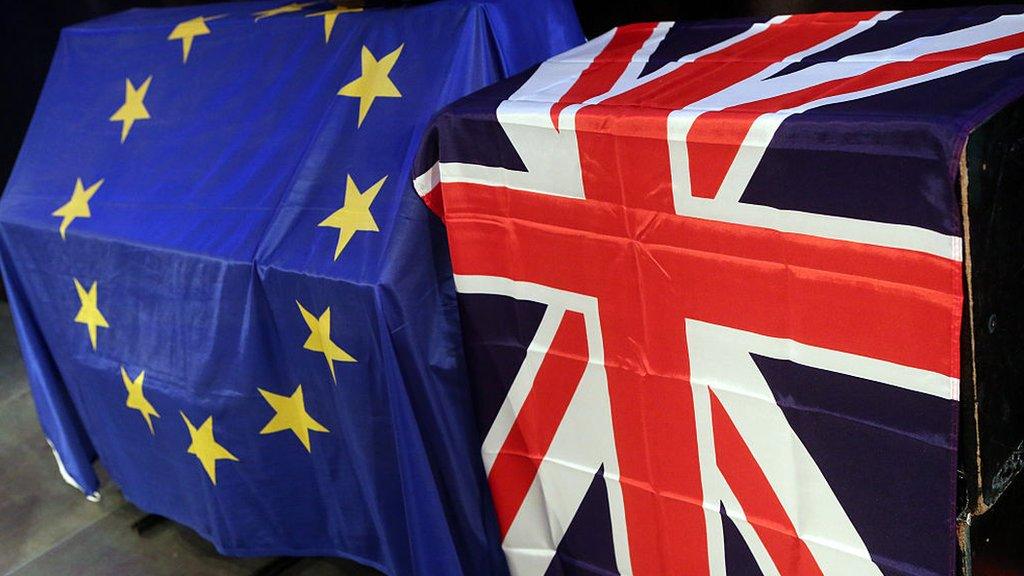Week ahead
- Published
- comments

It's a week dominated by three long days of detailed debate on the Brexit bill.
And (see my previous post) the government whips may come under rather more pressure than they did in notching up their imposing majority on second reading.
At committee stage, MPs can push detailed issues without opposing the bill outright, and a number of themes have surfaced.
Top of the list: the status of EU Nationals resident in Britain, and the linked issue of the status of Brits resident in the EU - these are people whose lives have been thrown into uncertainty, will they be able to stay? Will they need to seek citizenship? And plenty have been turning up at their MPs' surgeries to ask for answers.
The government has said it wants rapid agreement to sort the issue out, but there is pressure for the UK to make a unilateral offer to EU residents here, even if that sacrifices leverage over EU states later.
The lead amendment on this issue may well be the one offered by the Joint Committee on Human Rights - select committees are mucking into legislation more often these days - and its chair, Labour's Harriet Harman, who argues that it is simply wrong to treat people as "bargaining chips".
Ministers retort they will have no comeback if a handful of EU states do get tough on their British expats, and plan to resist; but this is the kind of amendment that could, conceivably, attract Conservative MPs - and no amendment gets through without some Tory support.
One Tory dissident who has broken cover is Neil Carmichael, the chair of the Education Committee, and a long standing pro-EU campaigner. He's minded to support amendments to give MPs a "meaningful vote" on the Brexit deal with the EU, so that they are not merely rubber-stamping a done deal, already signed, sealed and delivered.
This issue should come up on Tuesday afternoon - and there are several variations on this theme proposed by various pro-EU Labour MPs, like Chris Leslie's New Clause 110 requiring that MPs should vote on the deal before the European Parliament, and Pat McFadden's proposal for a meaningful vote at the end of the process.
The SNP have a proposal that the process should "reset" at the end of two years, and that the UK should default back to full EU membership, if no deal has been reached, arguing that the alternative is pitching UK industry into the position of trading with the EU on the (less favourable) World Trade Organisation terms with little warning.
For any of the above, or any of the myriad of other amendments to succeed, they will need to attract the votes of around 10 Conservative MPs, even if they can corral all the other Opposition parties.
Bear in mind that two Labour seats are vacant (Stoke Central and Copeland) and that a number of Labour MPs have been absent, ill, at various points. Some Conservatives in strongly remain constituencies may feel a little light rebellion on a specific point is a necessary gesture to their voters, and it will be interesting to see how far, if at all, the party whips are prepared to indulge them.
But if there are signs that a number are prepared to stray off-piste, the Northern Ireland DUP may find itself enjoying the courtship of ministers and promises of their favour.
Other events this week rather pale in comparison. But watch out for the government's promised Housing white paper - a major policy statement that, on another week, would grab a share of the headlines. The chatter is that it will be published early in the week - and you'd normally expect a statement in the House from the Communities Secretary, Sajid Javid. (It won't eat into the time allocation for the Brexit bill - MPs would just sit for longer, if a statement is added to the agenda.)
And on Thursday afternoon, watch out for the Culture Media and Sport Committee's innovative attempt to nudge the government into legislating to reform the FA.
Quite a number of MPs have constituency concerns about the governance of their local clubs and many are frustrated by the FA's ability to police the sport. As noted above, the committees are increasingly encroaching on legislation... but this is the first example I can think of, where they have attempted to use a backbench motion to goad ministers into action.
Here's my rundown of the week ahead...
Monday
The Commons opens (2.30pm) with Education questions. Any post-weekend ministerial statements or urgent questions will normally follow at 3.30pm - and that may or may not include the Housing white paper (see above).
Then the committee stage of the European Union (Notification of Withdrawal) Bill, external begins.
Seven hours of debate are scheduled from the moment it starts. The first four are on new clauses on parliamentary scrutiny of the process for the UK withdrawal. The hit list includes Labour Brexit spokesperson Keir Starmer's new clause 3 (NC3) requiring periodic reports to the House; former Labour Leadership contender Owen Smith's NC56 on approving the government's newly published white paper on Brexit, and a series of new clauses calling for reports on the specific arrangements proposed for the UK membership of European agencies like EUROPOL, external and EURATOM, external.
Then there's three hours on new clauses relating to devolved administrations or legislatures - there the SNP and Plaid Cymru have quite a few amendments - and the key one looks to be that "the Prime Minister may not exercise the power under section 1(1) until at least one month after all members of the Joint Ministerial Committee on European Negotiation have agreed a UK wide approach to, and objectives for, the UK's negotiations for withdrawal from the EU."
There's also an SNP call for the devolved administrations to have direct representation in the withdrawal talks.
Plaid Cymru, along with the Lib Dems Welsh MP Mark Williams and the Greens' Caroline Lucas, call for a report on funding for Wales. The aim is to see if the Leave campaign promise that EU funding levels would be maintained is being kept.
Labour has a proposal that the government "must consult, and take into account the views of, a Joint Ministerial Committee (of the devolved governments) at intervals of no less than two months, and before signing any agreements with the European Commission."
The adjournment debate is on HS2 in Yorkshire - Ed Miliband is calling for plans which involve demolishing 200 homes in a housing estate in his Doncaster North constituency to make way for the HS2 line to be scrapped. Expect an increasing number of debates about the routing of the next stages of the line.
In Westminster Hall (at 4.30pm) there's a debate on E-petition 165905, external: "The Conservatives pledged to shut down the UK's domestic ivory market in their manifesto for the past two elections. 30,000 African Elephants are slaughtered a year for their tusks yet, the government has still not outlawed the trade. From 2009 to 2014, 40% of UK customs seizures were ivory items"
The petition attracted 106,283 signatures.
My committee corridor pick is the Work and Pension hearing (3.45pm) on self-employment and the gig economy, where the witnesses include an Uber driver, a courier and entrepreneurs.
In the Lords (from 2.30pm) the main event is more detailed scrutiny of the Digital Economy Bill, external, covering digital government, data sharing for public benefit and the role of Ofcom. The dinner break debate is on the impact of Brexit on the transport sector in the UK.
And to the Moses Room (the Lords equivalent of Westminster Hal) - where the committee stage of the Neighbourhood Planning Bill, external continues. The day's debate will cover flooding, carbon compliance standards for new homes, saving pubs, sanctions on developers for project completion failure.
Tuesday
The Commons opens with Health questions (from 11.30am) and then the Labour MP Holly Lynch has a Ten Minute Rule Bill to bring in tougher sentences for assaults on Emergency Service Staff - and including requiring blood tests for people who spit on them, risking infecting them with various diseases.
Then it's on to day 2 of the European Union (Notification of Withdrawal) Bill committee stage. The first four hours will be devoted to new clauses on a vote on the final terms for withdrawal. These include Keir Starmer on a requirement for a vote at the end of the two year negotiating period, and (I expect) the SNP proposal that the UK defaults back to full EU membership if no deal has been reached.
The indefatigable Chris Leslie (one of the most enthusiastic proposers of amendments) has a proposal to allow the government extra time - and if there is any amendment from the pro-Brexit camp it will be a counter-measure to rule out precisely that.
There are also separate amendments from Labour remainers and the Lib Dems calling for referendums on the final deal. These may be ruled out because they have financial implications - but it is interesting that the two camps can't get together on this issue; there's no love lost, apparently.
This section of the debate is followed by a further three hours on a galaxy of proposals for impact assessments on all manner of issues raised by Brexit.
In Westminster Hall, my eye was caught by Plaid's Liz Saville Roberts' debate (4.30pm-5.30pm) on recruitment of under-18s into the armed forces....interestingly the debate may well be answered by the Armed Forces Minister, Mike Penning, the first "other rank" to hold that post.
He enlisted as a Grenadier Guardsman after leaving school, and went on to serve several tours in Northern Ireland.
My committee pick is the Health Committee hearing (2.30pm) to follow up its childhood obesity inquiry. That inquiry was crucial into pushing the government into supporting a tax on sugary drinks. The witnesses include Jon Woods, the General Manager for Coca-Cola and the Health Minister Nicola Blackwood.
In the Lords (from 2.30pm), peers will approve the order setting up the new West of England Combined Authority before moving on to the report stage of the Health Service Medical Supplies (Costs) Bill, external - there will be a vote on an amendment dealing with patients' access to new and innovative medicines and support for the life sciences industry.
And there may be another on thresholds for information requirements from pharmaceutical and medical supplies companies. There will also be a short debate on the report from the EU Committee on Brexit: future UK-EU security and police co-operation.
Wednesday
MPs warm up for the final day on the Brexit bill with questions to the Cabinet Office and the Chancellor of the Duchy of Lancaster (from 11.30am). Then, at noon, comes Prime Minister's Question Time.
Plaid Cymru's Liz Saville Roberts has a Ten Minute Rule Bill on sexual offences - among other things she's concerned about the circumstances in which the sexual history of a victim of rape can be introduced in trial - amid concern that rape victims will be reluctant to come forward in light of the evidence used in cases such as the Ched Evans appeal.
Then it's back to the European Union (Notification of Withdrawal) Bill, and the third day of committee stage consideration, which will deal with new clauses and new schedules relating on priorities in the Brexit negotiations plus any leftovers. The lead amendment will probably Keir Starmer's NC2, which requires that the negotiations should have regard to considerations like a stable economy, the Northern Ireland peace process, tariff free trade, etc.
Chris Leslie pops up again, calling for tariff free trade, and the Environmental Audit Committee chair, Mary Creagh has an amendment on environmental issues.

This looks like the probably moment for the Harriet Harman amendment (see above) on the status of EU nationals in Britain and UK expats in the EU. The Lib Dems propose a requirement that the bill could only come into force after approval of a report on withdrawal, and its impact on EU citizens living in the UK and on UK citizens in the EU. (I'm not sure if this would be in the process section of the debate, on Tuesday, or if it would slot in here - assuming it is called at all.)
After five hours, MPs will move on to the third reading of the bill - where there will be two hours of debate - and, I expect, another thumping majority.
In Westminster Hall debate (9.30am- 11am) the Conservative former minister, John Penrose, has a debate on low cost housing - with the government about to publish its long awaited Housing white paper (it may have been postponed while the Article 50 Bill dominates the news) and Mr Penrose wants it to include a provision to change planning laws to make it easier to build 'Up Not Out' in urban areas.
He argues that this will attract new investment, help regenerate town centres and bring fresh life to High Streets by allowing owners to build up to the level of other buildings in the same block (or the height of nearby trees if that's taller) without needing planning permission. He believes this would mean homes would become more affordable breaking the "stranglehold" of large housebuilding firms on new homes that are building, and, by releasing lots of over-looked town and city-centre building sites, it will reduce urban sprawl.
Later on (4.30pm-5.30pm) the Conservative Richard Benyon leads a debate on private renting solutions for homeless and vulnerable people - what can be done to incentivise private landlords to take on tenants who are previously homeless along with ensuring there are good preventive measures to stop someone becoming homeless after being evicted from rented home.
A notable statistic is that the majority of people who are homeless/rough sleepers were previously in the private rented sector.
On the committee corridor, the Joint Committee on Human Rights (which includes MPs and peers) has a hearing on Human Rights and Business (3.15pm) with the Small Business Minister, Margot James; Sarah Newton, the Home Office minister for Vulnerability, Safeguarding and Countering Extremism, plus Baroness Anelay, minister for the Commonwealth and the UN; and Sir Oliver Heald, minister for Courts and Justice.
And for the real aficionados, the Commons Procedure Committee (1.45pm) has a hearing with the Brexit Secretary, David Davis, looking at the issue of delegated powers in the Great Repeal Bill - this is about whether the government will end up with massive powers to change laws inherited from the EU via a streamlined procedure which would involve one-off votes un un-amendable motions - something some parliamentarians fear could amount to government by decree across huge areas of regulation and legislation.
In the Lords (3pm) there's more detail on the Digital Economy Bill - covering the BBC Charter and license fee, Ofcom, ticket touting and appeals.
Thursday
It's the morning after the three days before, as MPs gather at 9.30am for Culture, Media and Sport questions, followed by International Trade questions.
The weekly Business Statement from the Leader of the House will set out the Commons agenda when MPs return from their half-term, and then it's on to Backbench Business.
First up is a debate on Israeli settlements in the occupied Palestinian territories - on a motion calling for a halt to illegal settlements.

The second debate is an unusual one - the Culture Media and Sport Committee are backing a motion calling for the government to legislate to reform the FA. The committee has held several inquiries into football governance and they believe the FA can't reform itself, and that the scale of public concern about the running of the sport, and particularly the failure to tackle rogue club owners, justifies intervention; and they have even drafted a bill to show how it could be done.
In Westminster Hall (1.30pm) MPs will debate the Science and Technology Committee report, Evidence Check: Smart metering of electricity and gas, HC 161, external, and the government response to it. The report examined claims that the meters will save money for consumers and concluded it could cut consumption levels by 2-3%.
The committee also looked at claims that they would produce national benefits in terms of optimising electricity generation and storage, and paving the way for smart charging of electric vehicles - and during the debate, committee members will be pushing the minister for more information on those national benefits.
In the Lords (11am) look out for the first reading of the Brexit bill - this is just the formal announcement that it has arrived at the Lords end of Parliament, but might provoke some show of wailing and rending of garments from pro-EU peers.
The actual debating starts immediately after half term, with the second reading debate on Monday 20 February. So far, 96 peers have put their names down to speak - which may mean an early start for day two of the debate on Tuesday 21.
The actual business for the day is the Commonwealth Development Corporation Bill, external - a measure so uncontroversial it is being fast-tracked through all its stages. There's also a debate from the EU Select Committee on Brexit: financial services, external.
Neither House sits on Friday.
- Published30 December 2020

- Published28 March 2017

